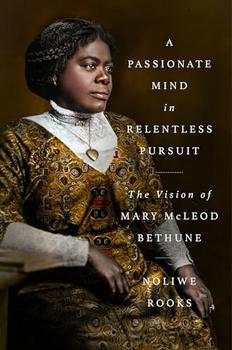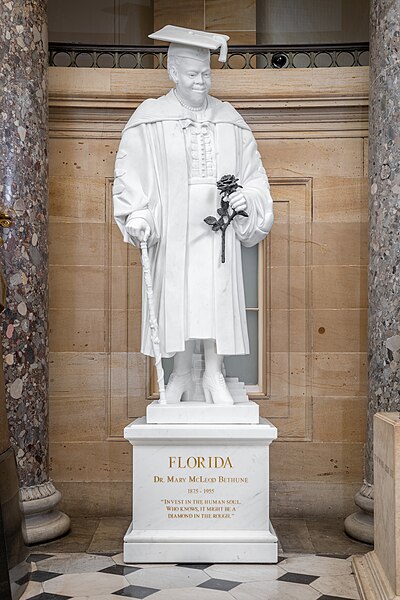Summary | Excerpt | Reviews | Beyond the book | Read-Alikes | Genres & Themes | Author Bio

The Vision of Mary McLeod Bethune
by Noliwe RooksAn intimate and searching account of the life and legacy of one of America's towering educators, a woman who dared to center the progress of Black women and girls in the larger struggle for political and social liberation.
When Mary McLeod Bethune died, tributes in newspapers around the country said the same thing: she should be on the Mount Rushmore of Black American achievement. Indeed, Bethune is the only Black American whose statue stands in Statuary Hall in the US Capitol, and yet for most, she remains a marble figure from the dim past. Now, seventy years later, Noliwe Rooks turns Bethune from stone to flesh, showing her to have been a visionary leader with lessons to still teach us as we continue on our journey toward a freer and more just nation.
Any serious effort to understand how the Black civil rights generation found role models, vision, and inspiration during their midcentury struggle for political power must place Bethune at its heart. Her success was unlikely: the fifteenth of seventeen children and the first born into freedom, Bethune survived brutal poverty and caste subordination to become the first in her family to learn how to read and to attend college. She gave that same gift to others when in 1904, at age twenty-nine, Bethune welcomed her first class of five girls to the Daytona, Florida, school she had founded and which would become the university that bears her name to this day. Bethune saw education as an essential dimension of the larger struggle for freedom, vitally connected to the vote and to economic self-sufficiency, and she enlisted Eleanor Roosevelt, Harry Truman, Franklin D. Roosevelt, and many other powerful leaders in her cause.
Rooks grew up in Florida, in Bethune's shadow: her grandmother trained to be a teacher at Bethune-Cookman University, and her family vacationed at the all-Black beach that Bethune helped found in one of her many community empowerment projects. The story of how Bethune succeeded in a state with some of the highest lynching rates in the country is, in Rooks's hands, a moving and astonishing example of the power of a mind and a vision that had few equals. Now, when the stakes of the long struggle for full Black equality in this country are particularly evident—and centered on the state of Florida—it is a gift to have this brilliant and lyrical reckoning with Bethune's journey from one of our own great educators and scholars of that same struggle.
In this slim volume, Rooks spotlights Bethune's lifelong commitment to Black higher education, which began when she created her own all-girls Black school in Daytona in 1904. She considers Bethune's emphasis on the twin pillars of "the ballot and the book" to achieve a more inclusive democracy but notes how her vision broadened over time to one "where Black women's issues and needs were not confined to specific regions or countries but had national and international resonance." And while Bethune championed education, equality, and justice for Black people in general, she was particularly committed to elevating Black women, as Rook observes: "Bethune dreamed of a world where Black women and girls basked in the warmth of their collective suns."..continued
Full Review
 (577 words)
(577 words)
(Reviewed by Peggy Kurkowski).
 As Noliwe Rooks rightly asserts in her book A Passionate Mind in Relentless Pursuit, Dr. Mary McLeod Bethune was a woman of many "firsts." Even though she died in 1955, Bethune made another historic first on July 13, 2022, when she became the first Black person to have a state-commissioned statue in the U.S. Capitol's National Statuary Hall Collection. Rooks describes the process of how the monument, created by sculptor Nilda Comas, found its way there and into her heart.
As Noliwe Rooks rightly asserts in her book A Passionate Mind in Relentless Pursuit, Dr. Mary McLeod Bethune was a woman of many "firsts." Even though she died in 1955, Bethune made another historic first on July 13, 2022, when she became the first Black person to have a state-commissioned statue in the U.S. Capitol's National Statuary Hall Collection. Rooks describes the process of how the monument, created by sculptor Nilda Comas, found its way there and into her heart.
According to Rooks (whose thoughts on the subject can also be found in a 2022 essay for Time), Bethune's statue is chiseled from Italian Carrara marble that comes from the same quarry and vein that Michelangelo used to make his famous sculpture David, and from this...

If you liked A Passionate Mind in Relentless Pursuit, try these:

by Kellie Carter Jackson
Published 2025
A radical reframing of the past and present of Black resistance—both nonviolent and violent—to white supremacy.

by Scott Shane
Published 2024
A riveting account of the extraordinary abolitionist, liberator, and writer Thomas Smallwood, who bought his own freedom, led hundreds out of slavery, and named the underground railroad, from Pulitzer Prize-winning author and journalist, Scott Shane. Flee North tells the story for the first time of an American hero all but lost to history.